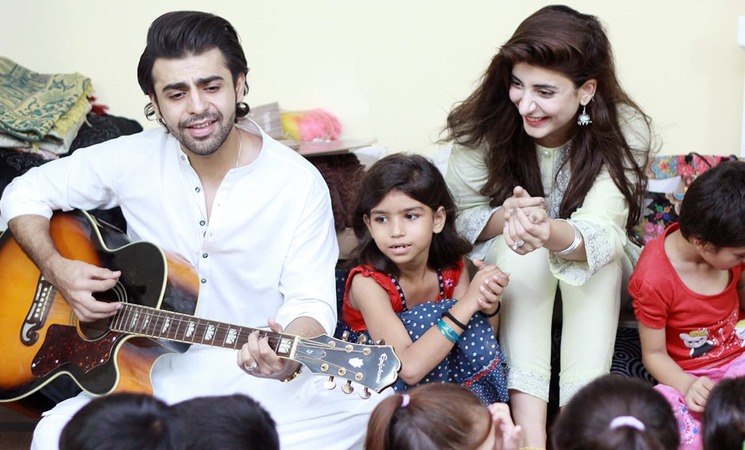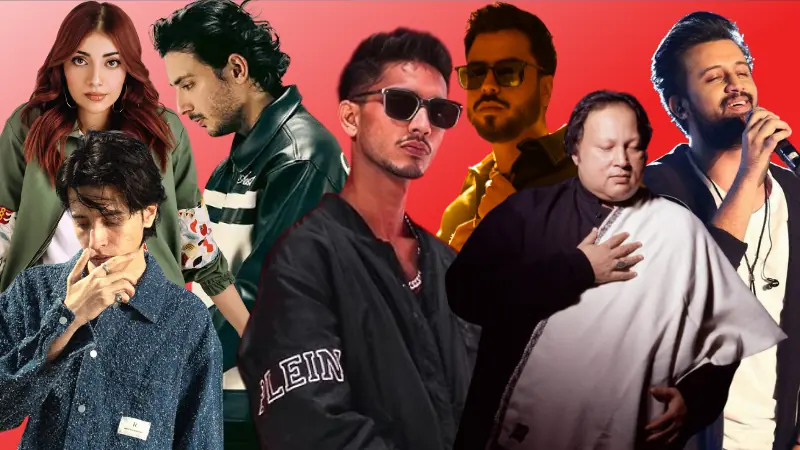Dance numbers don't necessarily objectify women, says Urwa Hocane
If there's a dialogue that will stay memorable way past its film's box office run, it's 'Help me, Durdana'.
Urwa Hocane's Durdana made a big impact in Punjab Nahi Jaungi (PNJ) and we still see her memes floating around on our Facebook news feeds. Her other Na Maloom Afraad 2 (NMA2) also helped in bringing Pakistani cinema back on the map film this Eid after a borderline-appalling year at the movies.
But it hasn't been smooth sailing for Urwa — she was missing from the promotions of NMA2, fuelling rumours of a fall-out with the producers, and some have criticised her roles as too lean for an actor of her stature.
Here's what Urwa has to say about those matters and more:
Images: “Help me Durdana” has become a phenomenon on social media. How does that feel? How was the experience working on the film?
Urwa Hocane: There’s a lot of hard work and love that’s gone into bringing Durdana to life and getting the love back from people who’re watching the film feels absolutely amazing.
As far as the experience of working on Punjab Nahi Jaungi (PNJ) is concerned, the journey involved a lot of creativity and fun times that have translated into really great memories. I know you get to hear this from a lot of people, but trust me when I say this that we had become a family.
Images: Do you think Durdana’s track in Punjab Nahi Jaungi lacked a back-story and closure?
Urwa: Well that’s true, but you see even when you don’t know all the details about her, Durdana did manage to leave an impact.
At the end of the day, PNJ is a love saga revolving around Amal [Mehwish] and Fawad [Humayun], with Durdana being a catalyst that takes their relationship forward.
And given the fact that a film can only be so long, it’s not possible that every single character gets their back-stories and conclusions. Had it been up to me, I would’ve loved to continue Fawad, Amal and Durdana’s stories and see what happens next in their lives [laughs].

Images: Your contemporary Mehwish Hayat takes the lead in the film. Do you have any reservations in playing second fiddle to her?
Urwa: Not at all, I love Mehwish. In fact, I got very excited when I was told she was a part of the project because back in 2014, it was her and I promoting Na Maloom Afraad (NMA) since Kubra [Khan] was back in the UK.
I connected with her back then, we formed this ‘Girls’ Squad’ of ours [laughs]. I really enjoy her company, she’s fun, supportive, and she elevates the person who's with her, and I think I’m also a similar kind of a person.
Images: Even though your song ‘24/7 Lak Hilna’ wasn’t an item song, for which you were criticized initially, are you open to doing one?
Urwa: ‘24/7’ came out the same day as ‘Kaif-o-Suroor’ so people just confused it to be an item number and started judging it accordingly. Now you know it is just a wedding song.
As far as doing an actual item number, a term I don’t endorse, I think calling such songs dance numbers is good enough. As far as my doing a dance number is concerned, that depends on how I’m feeling at the time I’m offered one. I don’t see dance numbers as necessarily objectifying women. Sometimes they are relevant to the film’s narrative.
Images: Are you feminist?
Urwa: Yes, I am and I believe everyone must be. I feel that at times feminism or feminists are wrongly considered to be anti-men, which is unfortunate. Having said that, yes, I do believe in equal rights for women, and that they should pursue their dreams, be as ambitious or maybe even more than men, but there’s no competition.
Men and women both deserve the freedom to dream and follow their heart. I want girls to discover what they really want to pursue and not fall prey to other people’s opinions of them.
Images: Do you have a criteria for taking up a project – is screen-time something you consider?
Urwa: I am very bad at maths anyway, so I don’t calculate minutes of my screen-time... I can’t get into these calculations [chuckles].
For PNJ too, I never thought of how much screen-time I would get. It’s the kind of project anyone would have wanted to be a part of.
As far as the criteria for choosing characters is concerned, I don’t have a rule book. I feel it’s always very instinctive. Once you like the script, you look into the other aspects: the cast, the filmmakers, so you get a vibe.
Had I followed a certain rule book, I wouldn’t have done Rangreza because it’s being made by newcomers. And perhaps I might not have done NMA, because back then Nabeel [Qureshi] and Fizza [Ali Meerza] were also just starting off.
Images: The sequel to your debut film, Na Maloom Afraad 2 also released this Eid, and your rumoured tiff with the producers was apparently the reason we didn’t see you during promotions. How far is that true?
Urwa: Not true at all. If I had some grudge, I wouldn’t have shot and dubbed for the film.
Since I had two films coming out, I could only be present at the promotions for one, especially since both promotional campaigns involved extensive touring. However, I did shoot some magazine covers, digital videos and interviews specific to NMA2; it would be incorrect to say I didn’t promote it.

Images: What was it like returning back to your first cinematic role, Naina in the NMA franchise?
Urwa: It was fun. But I think Naina, in the first installment, had a lot more to offer. Even Billi [Mehwish Hayat in a cameo appearance] had a lot to do in the story.
Naina’s character wasn’t as significant this time around, and I expected Fizza, being a female producer, to have well-defined female characters in her films. And that’s something I have conveyed to Fizza and Nabeel.
Images: You’re also expecting your third cinematic release Rangreza this fall. How were you approached for that?
Urwa: Rangreza’s director Aamir [Mohiuddin] and his team got in touch with me. I didn’t know him then, but we set up a meeting and I took some time in reading the script. They told me how they wanted the visuals to be, how they’d be treating the scenes, and their vision, and I felt that they would be able to execute it well, so I just followed the vibe I got.
Images: Do you think there are more ups and downs shooting with first-time directors?
Urwa: There are, but you also can’t expect a newcomer to put up a set like Nadeem [Baig] does, for instance.
We all need to make some compromises because this is how the industry will grow. We must lend our support to aspiring filmmakers by bearing with whatever little trouble we have to, because we need new people to come in and that can't happen unless we encourage them.
To sustain local cinema and have a certain number of releases each year, we need more people to make films.
Images: Lastly, what other projects are you looking into? Are there any plans of turning back to television?
Urwa: I think the best part of being an actor in Pakistan is that you’re open to both the mediums [of film and TV].
For now at least, TV is perhaps bigger than film, so we have more choices of the kind of characters and scripts we want to take up. Even now, whenever I find time, I binge-watch some dramas I’ve missed.
However; the projects I’m working on and reading are films.












Comments